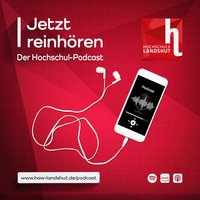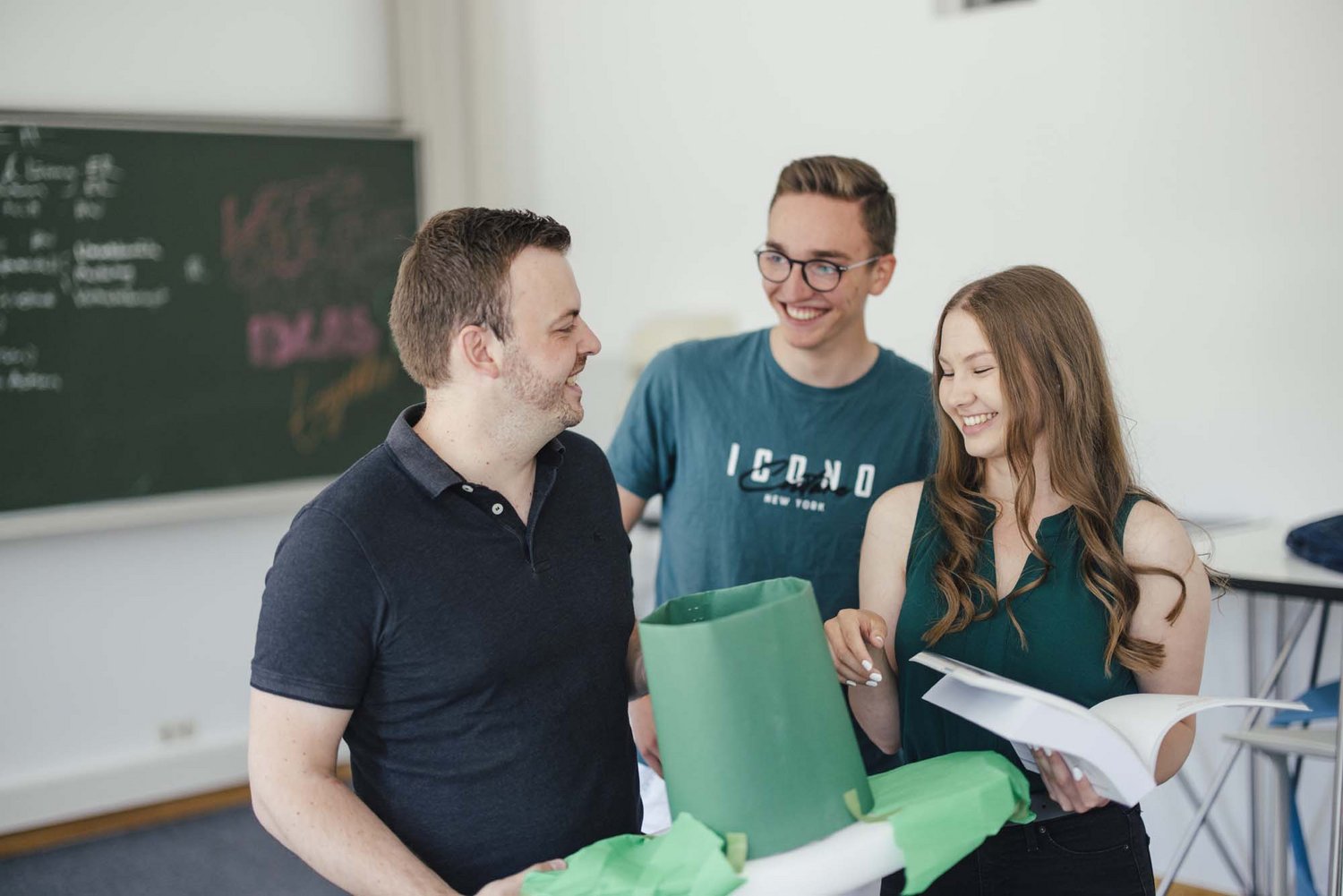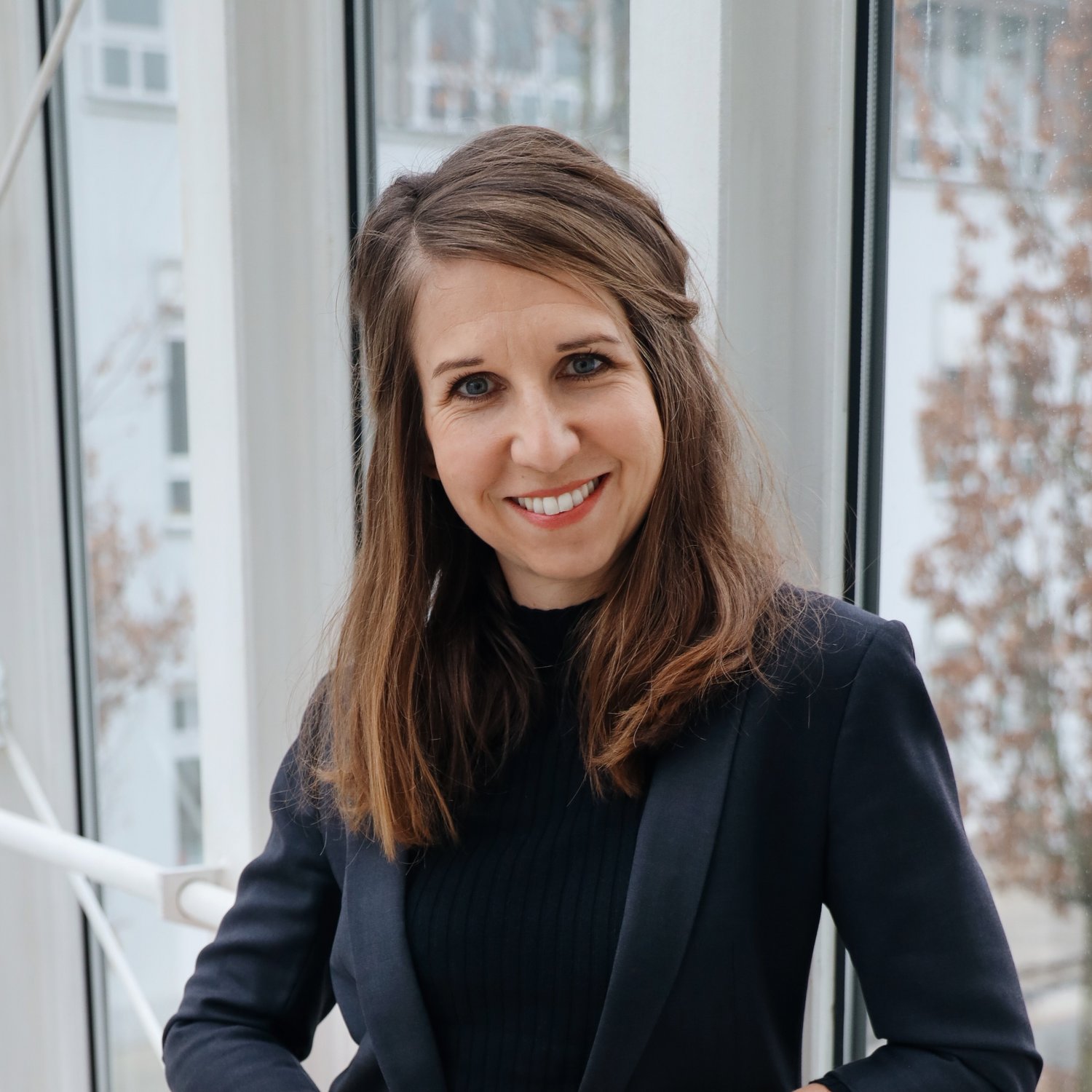
Media and Communication Management
Bachelor
Engage in dialogue with employees, influencers and investors. Creating presentations, videos, podcasts and events. Answering questions in crises. This is what communication managers do in companies. The Bachelor's degree programme in Media and Communication Management provides the know-how, strategies and techniques for this. It combines corporate communication with business management fundamentals in a unique way and thus optimally prepares students for the modern world of media.
| Start | Winter semester |
|---|---|
| Admission Criteria | Restricted admission |
| Application period | 28.04.2025 - 15.07.2025 |
| Study format | Full time, with in-depth practical experience |
| Study cost | None (only semester fee) |
| Normal duration | 7 Semester |
| Language | German |
| ECTS | 210 |
The study programme / profile
The Bachelor's degree programme in Media and Communication Management aims to enable students to independently apply scientific knowledge and methods in communication professions by offering a practice-oriented range of courses. Students qualify to work independently in communication professions in business, NGOs, associations and public institutions.
Graduates plan, organise and manage communication with customers, employees, investors and political decision-makers in politics and society. They are responsible for media and communication management for the company's own media and channels. To do this, they create analyses, develop concepts, implement measures and measure the results. Later, they take on management tasks and personnel responsibility in communications departments, or they become self-employed and work as entrepreneurs or freelancers.
Specialisation options
After the foundation and specialisation semesters and the semester internship, students on the Bachelor's degree programme in Media & Communication Management expand their expertise in the Marketing, Communication & Sales competence module. They choose a further specialisation from the competence modules offered in the study and examination regulations.

Contents and course of study
In the Bachelor's degree programme in Media and Communication Management, students acquire fundamental knowledge of internal and external corporate communication. In creative courses, they develop social media campaigns, videos, podcasts and publications for various target groups. Practice-orientated methods such as case studies and practical projects offer insights into employee communication, media relations, investor relations and public affairs. The programme comprises six theoretical semesters and one practical semester. The first two semesters teach the basics of business administration and corporate communications. In the second year, business management functions are covered and knowledge of external communication and communication analysis is acquired. The fifth semester is a practical semester. In the final year, students specialise in marketing, communication and sales and choose a further specialisation according to their interests. The Bachelor's thesis concludes the programme.
learn moreDual study programme
The dual study programme is a practice-oriented form of study that combines theoretical course content at universities with professional practice in a company. During their dual study programme, students complete both lectures at the university and practical assignments at the company, allowing them to acquire both academic knowledge and practical experience at the same time.
Learn moreProspects after graduation
Corporate communication has become much more important. Media and communications managers are in greater demand than ever before. Companies and public organisations are looking for well-trained specialists for their communications. Thanks to the close connection between communication and business fundamentals, students are optimally prepared for this. The practice-oriented degree programme enables students to join a communications team in a company or work as a junior consultant in a communications agency.
A wide range of career paths are open after graduation.
- Press spokesperson/representative
- Speakers for internal communication
- Content strategists and managers
- Social media and community managers
- Specialists for financial or political communication
- PR and communications consultants in agencies

Requirement profile
If you enjoy writing or creating photos and videos, you have important creative talents for the Media & Communication Management degree programme. Other good prerequisites are a strong interest in media as well as economic and social trends.
Learn moreIt is important to distinguish whether you are applying for a Bachelor's or Master's degree programme. There is also a difference as to whether the Bachelor's degree programme is admission-free or admission-restricted (with NC). Further information on the application and admission procedure can be found here.
The university determines the number of places to be allocated for individual degree programmes. From the applications received for places on degree programmes with restricted admission, the best students from various groups (Abitur, Fachabitur, master's degree, second degree, etc.) are admitted according to a ranking list until the number of places to be allocated is reached. The NC (Nurmerus Clausus, average grade for admission) is calculated each year from the average grade of the last university place awarded. Experience shows that the NC fluctuates considerably from year to year when there are only a few study places to be allocated and cannot be predicted in advance of admission. It is therefore not the grade point average required for admission that is specified in advance, but the number of study places to be allocated.
Depending on whether you have already studied something similar or the same degree programme elsewhere, you either apply for a higher semester or start a new degree programme in the first semester. If you apply for a higher semester, the creditable examination results in particular determine whether you can be admitted. More information here.
If you can prove that you have already acquired comparable skills - either through professional experience or as part of a previous degree programme - you can apply to have these recognised. The application must be submitted to the Student Service Centre and will then be reviewed by the relevant examination board. You will be informed of the decision after approx. 2-3 weeks. The application can be found here.
Once you have registered in the applicant portal and uploaded your documents, you will be kept up to date on the progress of your application. If something is missing or incorrect, which would lead to exclusion from the award procedure, you will also be notified there. The letter of admission is also available for download there. Click here to go to the applicant portal.
As part of the application process, if you accept the study place offer, you must contact your health insurance company and inform them that you intend to start studying at Landshut University of Applied Sciences. The health insurance company will then confirm directly to us via a digital message that health insurance cover is in place. If you have private health insurance, you must consult a statutory health insurance company and request confirmation of exemption. This will also be reported to us digitally. Information on health insurance during your studies can be found here.
By paying the student union fee, which must be paid before starting your studies and then once per semester, you acquire a semester ticket. This semester ticket entitles you to use local public transport in the area covered by the Landshut Transport Association (LAVV). The semester ticket is printed on the student ID card and must be presented without being asked before travelling. Details can be found here.
The student ID card is sent to you by post before you start your degree programme. You can use your student ID to pay in the canteen or use the 24-hour library, for example. The semester ticket is also printed on the student ID card. The student ID card must be revalidated for the following semester after re-registration. You can find out more here.
For all degree programmes that are not part of the continuing education academy, there are generally no tuition fees. Irrespective of this, the student union fee must be paid once per semester. This solidarity contribution provides financial support for the canteen or the student halls of residence of the Studentenwerk Niederbayern/Oberpfalz, for example. The semester ticket is also included. Further information here.
We would like to invite all prospective students to our information events on campus! In addition to the study information day, there are also smaller online and face-to-face events such as the university podcast or the applicant day and much more, where you can get detailed information about degree programmes and Landshut University of Applied Sciences. Our counselling services can also be used for personal consultations at any time.
At the start of their studies, our first-year students are warmly welcomed and provided with all the necessary information. You will be given an introduction to how the university platforms work, the lecture timetable, the Studium Generale and much more!
BAföG is administered by the Studentenwerk Niederbayern/Oberpfalz. This is located in Regensburg. You can either go there directly or contact the BAföG counselling centre of the Studentenwerk N/O in the E building.
Landshut University of Applied Sciences and the Studentenwerk Niederbayern/Oberpfalz offer students free psychological counselling in difficult life situations. You are welcome to get in touch with the contact persons at any time.
Attractive companies advertise study-related jobs such as internships, student traineeships and entry-level positions on the university job exchange. In addition, the part-time job exchange offers a variety of mini and holiday jobs to finance your studies.
The Studentenwerk Niederbayern/Oberpfalz currently manages three public student halls of residence in the immediate vicinity of the university. There are also six other halls of residence run by private organisations. More information here.

Information for students
Here you will find comprehensive information about starting your degree programme. This includes important downloads and quick links to help you get started. You will also find contact details that can help you with any questions relating to your degree programme.
learn more





